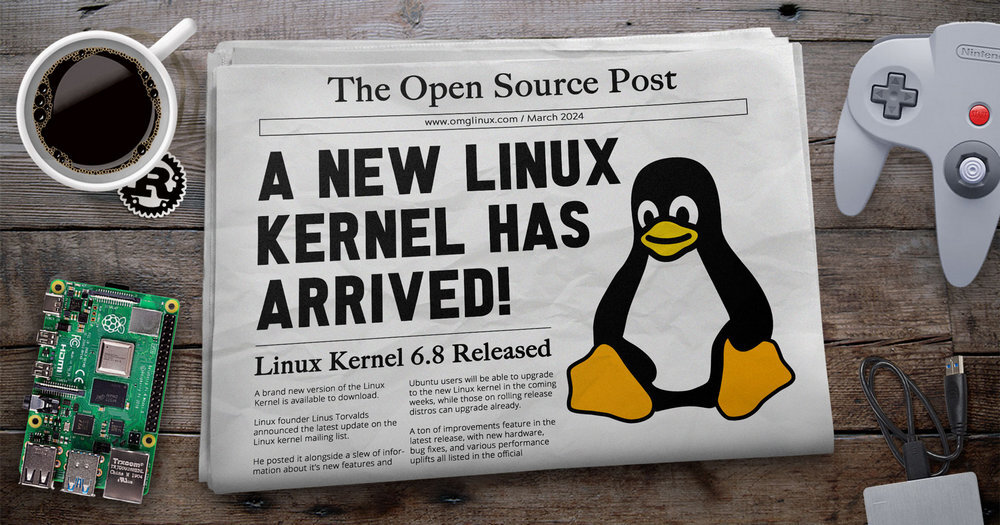 Linus Torvalds heeft versie 6.8 van de Linux Kernel vrijgegeven. De kernel is het hart van het besturingssysteem en zit, simpel gezegd, als laag tussen de hardware en de applicaties in. In versie 6.8 treffen we onder meer verbeteringen aan voor de Raspberry Pi 5 en apparaten uitgerust met een Meteor Lake-processor. Meer informatie is bij 9to5Linux te vinden. Hieronder is een door OMG Ubuntu samengesteld overzicht te vinden van de belangrijkste veranderingen en verbeteringen in deze uitgave.
Linus Torvalds heeft versie 6.8 van de Linux Kernel vrijgegeven. De kernel is het hart van het besturingssysteem en zit, simpel gezegd, als laag tussen de hardware en de applicaties in. In versie 6.8 treffen we onder meer verbeteringen aan voor de Raspberry Pi 5 en apparaten uitgerust met een Meteor Lake-processor. Meer informatie is bij 9to5Linux te vinden. Hieronder is een door OMG Ubuntu samengesteld overzicht te vinden van de belangrijkste veranderingen en verbeteringen in deze uitgave.
Linux 6.8: New Features
- Linux 6.8 adds Raspberry Pi 5 support to the V3D DRM driver, including GPUTop and FDINFO support. This means any distro offering Mesa 23.3 and Linux 6.8 will provide a solid graphics experience out-of-the-box on the Pi 5, no kernel patches required. This will help ensure Ubuntu 24.04 LTS runs sweet as pie on the Raspberry Pi 5.
- In this kernel version, the zswap subsystem is able to force cold pages out to real swap when memory pressure gets too much (with opt-out for those who don’t wish to use this). There’s also a new zswap mode to disable writing back to swap entirely.
- Linux kernel 6.8 is able to prevent direct writes to block devices with mounted filesystems (excepting Btrfs for the moment ). Devs say writing to mounted devices can lead to filesystem corruption and crashes. Although this is disabled by default Linux distros are likely to enable it.
- An adjustment to the Intel P-State CPU frequency scaling driver will mean devices powered by Intel ‘Meteor Lake’ CPUs (released at the end of last year) hit their advertised ‘boost’ speeds under Linux, as under the previous kernel they were found to be running ~100MHz under. Thus, if you use Linux on a Lenovo ThinkPad X1 Carbon (Gen 12), Acer Swift Go 14, ASUS Expertbook B5, or another laptop powered by Intel Core Ultra mobile processors you can expect a pinch more performance during peak loads when running the newest Linux kernel.
- On the subject of portables, AMD Ryzen 7000 (and upcoming Ryzen 8000) laptops were suffering from radio frequency interference (RFI) from the Wi-Fi and GPU memory clocks. Linux 6.8 includes AMD RFI mitigations (WBRF) to resolve this.
- Network-related: Linux 6.8 includes networking buffs that provide better cache efficiency. This is said to
improve“TCP performances with many concurrent connections up to 40%” – a sizeable uplift!Linux gamers will be pleased to hear that Linux 6.8 now supports:
- Nintendo Switch Online controllers
- Powkiddy X5 & RK2023 handheld consoles
- Adafruit Mini I2C gamepads
- Lenovo Legion Go controllers
- Colour management on the Steam Deck
- And also includes driver fixes for the official Steam Controller.
In addition to the above, here are some other choice highlights in Linux 6.8:
- New
statmount()andlistmount()system calls- New deadline servers mechanism
- Rust kernel support for LoongArch CPUs
- Possible to change the size of tracing sub-buffers
- Guest-first memory feature for KVM
- KSM advisor for auto-tuning kernel samepage merging subsystem
- 11% (or so) higher sys call entry performance on IBM Z
- New PHY network driver written in Rust
- Intel Trust Domain Extensions (TDX) host-side support
- Intel IAA compression accelerator
- dmesg info on whether 32-bit support is disabled at boot
perftool now supports data-type profiling- Apple M1 Thunderbolt DART support
- Bcachefs gains initial online filesystem check and repair
- AppArmor switches to SHA-256 for policy-hash verification
Finally, while few (if any) of us run Linux on RISC-V boards there’s no denying that the open-source processor architecture has a bright future.
Linux kernel 6.8 adds support for AMD’s MicroBlaze V soft-core RISC-V CPU, XIP kernel features,
riscv_hwprobe()system calls, can now suspend to RAM on RISC-V when the SUSP SBI extension is present, and ships a new camera subsystem driver for the StarFive SoC.


:strip_exif()/i/1274122604.png?f=thumbmedium)